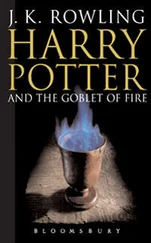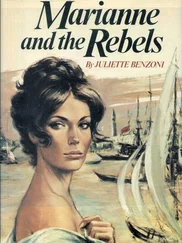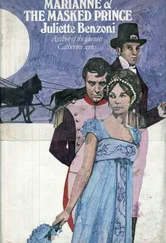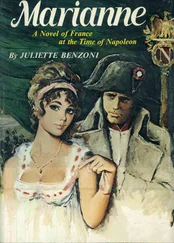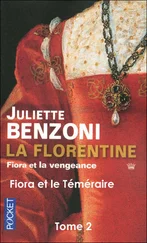Juliette Benzoni
Marianne and the Crown of Fire
CHAPTER ONE
The Banks of the Kodyma
The plain stretched endlessly in all directions. Its silvery surface rippled gently in the summer sunshine as the light wind sent it rolling in long waves to the horizon. It was as if some fabulous goddess had let down her floating mane of silken hair after a party. Here and there gleamed the red flower of the wild thistle or the plumed heads of feather-grass.
The heat grew more intense the farther they advanced and by midday was often suffocating, yet Marianne had never been so happy.
In the week or more since she had been travelling with her companions over this vast sea of grass she had experienced a happiness so deep and piercing that it was almost painful. But she knew that this time of grace could not last and that at the end of the long, northward journey was the war that must shatter her present happiness, and so she snatched at it like a starving man, obsessively searching out the smallest crumb and savouring it to the last.
By day, they journeyed across the steppe from one stage to the next. The posting houses lay at intervals some fifteen versts, or roughly ten miles, and thanks to Gracchus's miraculously acquired permits they were able to change horses, and drivers also, without finding themselves fleeced. The drivers thought themselves well paid at two kopecks a verst and sang all day long.
In theory they covered two stages a day, stopping at night to rest, and the posting houses doubled also as inns, which were otherwise non-existent in the great steppes. The travellers found rooms right enough, but for the most part they were unfurnished, except for the inevitable icons on the walls, hence the necessity for the mattresses with which Gracchus had provided them. Sometimes it was possible to obtain food as well but this varied according to the wealth and generosity of the landowner on whose estates the inn was situated.
The inns, in fact, were a charge on the local nobility, who in the Ukraine and the ancient region of Podolia were mostly Polish. These maintained both horses and staff and for the most part got little enough in return, since paying travellers were few, owing to the ease with which the celebrated permits could be procured.
In her character as an English lady, Marianne might easily have claimed the hospitality of the nobles themselves and have found in their houses, though few and far between, a degree of comfort and even luxury unknown to the imperial post roads. But these mansions, situated in the midst of vast cornfields which in the rich black earth of the steppes grew as rampantly as weeds in a wilderness, often lay a long way from the road. Besides, she had grown to like the bare rooms, with their clean-smelling wooden walls, where they put down their mattresses and she passed passionate nights in Jason's arms, nights that would have been impossible in a private house where the 'manservant' would have been relegated to the servants' quarters.
Both of them had suffered too much and had been parted for too long to have a thought to spare for keeping up appearances or for making any sort of pretence to their companions. Jason had laid his cards on the table the very first night, in Count Hanski's posting house. They had no sooner finished their meagre dinner of duck stuffed with mince and sour milk than he had risen to his feet and silently held out his hand to Marianne. With a deep 'goodnight' to the assembled company, he had borne her off to her bedchamber.
There, still without a word, they faced one another and, not touching but with their eyes locked in each other's, they had proceeded methodically to undress. As two hands meet and clasp, they came together and together they remained, as one, oblivious of the world around them, until morning light.
Every night after that the lovers lost themselves in their shared ecstasy. By day they abandoned themselves to the endless rocking of the kibitka as it travelled over the highroad. For the most part they slept, despite the jolting and the heat, which both shortened the journey and left them fresher for the night. Twilight falling and the scent of wormwood rising from the steppe would reawaken their desires and from then on they lived only for the magic moment that would lift them out of time, to become once again the first man and woman, naked together in the first night of the world.
Jason's thirst for this woman was insatiable. With her, he could forget his lost ship, the war that lay ahead and all past bitterness and misunderstanding. While in his arms Marianne forgot the child she had lost, her mysterious husband, the perilous secret she carried and all her past sufferings. Above all, for both of them, came forgetfulness that each day was carrying them deeper into a country rent by invasion, bringing them nearer to the blazing heart of the volcano and to the inevitable moment of parting. For with the feel of the imperial letter moving lightly against her skin under her dress Marianne sensed even then that she would never go with Jason to St Petersburg, that the time would come when she must make the choice that would divide their paths once more, for how long she could not tell.
Her task was to reach the Emperor and speak to him. And after that she must return to Paris to await the Cardinal's messenger and give into his hand the diamond she carried at her breast, in a little wash-leather bag sewn to her chemise. It was not in her power to go straight to America. Later, yes, but for the present there were things she still had to do in Europe. Even if it were only to make one more attempt at a last sight of her baby, Sebastiano.
On the evening of the ninth day, the road came to a river. It lay in a shallow valley lined with bushes and small trees, bent by the wind that blew off the steppes, and planted with a patchwork of crops that ranged from grain to melons, and water melons too. The wide blue stream flowed between reedy banks where fishing boats bobbed lazily at their moorings, along with what appeared to be some kind of ferry boat. This was the Kodyma, a tributary of the Bug. A village had grown up on the bank and it was here the travellers came just as the sun was setting.
It was not a large place, consisting only of a group of whitewashed, reed-thatched houses, each with its vegetable patch and cluster of outbuildings, scattered about an open space facing the church. This too was whitewashed and built in the shape of a cross with equal arms, each with its small pediment, facing to the four cardinal points, so that the priest in charge might look eastward while saying mass. In the centre was a gilded onion dome surmounted by a Greek cross that caught the light of the setting sun. Ducks and chickens wandered at will and rose-coloured kingfishers were swooping low over the river.
The posting house stood at the roadside some little distance from the centre of the village. The kibitka drew up before it, startling a pair of fat bustards into cumbrous flight. The driver, reining in his horses, said something only Gracchus who, far from wasting his time in Odessa, had acquired a fair smattering of the difficult Russian language, was able to understand.
'He says this place is called Velikaia Stanitsa,' he translated now. 'It's a cossack village.'
'Cossack?' exclaimed Jolival, in whom the word had roused a passion for history that was never very far below the surface. 'How can that be? I thought this was the territory of the old Zaporogi, suppressed by Catherine the Great in the last century.'
'Well, she can't have suppressed all of them,' Craig suggested. 'There must have been some left over.'
Gracchus essayed a question or two, to which the driver responded with a lengthy speech that came as something of a surprise from one who had so far done little more than sing.
Читать дальше

